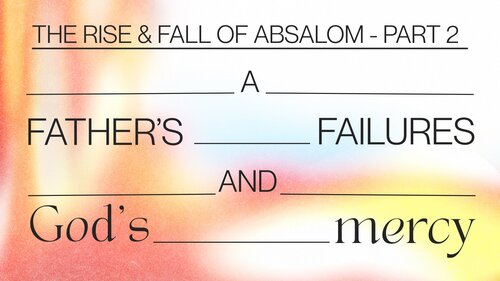The Rise and Fall of Absalom: Week 2 — Father’s Failures, God’s Mercy
The Rise and Fall of Absalom: Week 2 — Father’s Failures, God’s Mercy

“Is there anyone still left of the house of Saul to whom I can show kindness for Jonathan’s sake?”
The answer? Mephibosheth—a wounded, forgotten prince hiding in Lo Debar, a place that literally means “nowhere.” And yet, because of a covenant David made with Jonathan years earlier, Mephibosheth is brought from obscurity to honor, from shame to sonship. He didn’t earn it. He didn’t request it. It was all grace.
From Lo Debar to the Table
Last week, we unpacked how David’s invitation to Mephibosheth reflects the very heart of God. This week, we’re going deeper—into what happens when fathers fail, but mercy still finds a way.
David’s commitment to Jonathan didn’t waver, even after Saul’s rebellion. God’s mercy didn’t fail, even when the bloodline did.
This is a story of covenant, restoration, and a God who keeps His word when everyone else breaks theirs.
Mercy in the Midst of Mess...lets look at a few areas where God is at work even in the midst of the mess:
1. Grace Isn’t Earned. It’s Given.
“While we were still sinners, Christ died for us.” —Romans 5:8
Just like Mephibosheth, we were spiritually lame—carrying shame from someone else’s sin, distant from God, living beneath our identity. But grace found us. Mercy summoned us. The table was already set before we even knew we were invited.
2. Sin’s Fallout Is Real—But So Is God’s Faithfulness.
Saul Failed.
“To obey is better than sacrifice...” —1 Samuel 15:22
Saul’s rebellion wasn’t just disobedience; it was arrogance wrapped in religion. God had raised him from nothing, but he forgot who put him there. When we trade obedience for performance, we lose sight of grace.
Jonathan Suffered.
He was loyal, but caught in a legacy that was crumbling. Like so many of us who grew up in divided homes or chaotic households, Jonathan’s story is a mirror. He knew David was God’s chosen, but stayed tethered to Saul’s house—and died under its judgment.
“Don’t be afraid... You will be king... and I will be second to you.” —1 Samuel 23:17
Sometimes loyalty to family must bow to loyalty to God. The Kingdom comes first.
Mephibosheth Was Blessed.
Though crippled and overlooked, he receives restoration—not because of who he is, but because of WHOSE he is. His blessing is the overflow of a covenant he never made.
What This Teaches Us
1. God’s Mercy Isn’t Performance-Based
David wasn’t perfect. He was flawed, reactive, even reckless at times. But he was a man after God's own heart—because he knew how to repent. Grace isn’t for the flawless. It’s for the humble.
“Be perfect... as your heavenly Father is perfect.” —Matthew 5:48
Jesus isn’t calling us to perfection through effort, but through surrender.
2. Covenant Outlasts Cancel Culture
In a world quick to throw people away, God restores.
In a culture eager to discard the broken, God sets a place at His table.
“So Mephibosheth ate at David’s table like one of the king’s sons.” —2 Samuel 9:11
We don’t just visit the table—we become family.
The Power of Covenant
David honored his vow to Jonathan, years after the battle, years after the bloodshed. That’s what covenant does—it reaches beyond the grave.
“Let your ‘yes’ be yes, and your ‘no’ be no.” —Matthew 5:37
God is a covenant-keeping God. He doesn’t cancel promises just because the people attached to them fall short.
We’re called to reflect that faithfulness:
- In marriage
- In ministry
- In salvation
“Christ died for us while we were still sinners.”
Mercy Must Flow
Because you were shown mercy, extend mercy.
Because you were forgiven, forgive.
Because you were once the Mephibosheth in the story—don’t forget the view from Lo Debar.
“The one who is forgiven much, loves much.”
Finally, Are You Living Like a Covenant Child?
The enemy’s strategy is simple:
- If he can’t steal your salvation, he’ll try to rob your confidence.
- If he can’t stop your future, he’ll try to bind you in religious fear.
- If he can’t disqualify you, he’ll convince you you’re powerless.
“You are no longer a slave... but a child... an heir.” —Galatians 4:7
“You are a chosen people... God’s special possession...” —1 Peter 2:9
You’re not in Lo Debar anymore.
You’re at the table.
Live like it. Love like it. Lead like it.

No Comments